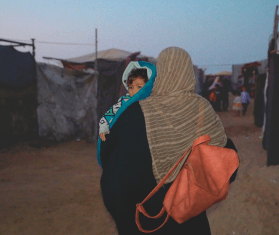In 2024, malnutrition levels reached a crisis point in several of the countries where Doctors Without Borders/ Médecins Sans Frontières(MSF) works. These emergencies were triggered by multiple factors, including lack of access to nutritious food and the spread of disease amid war, displacement, and climate change.
Malnutrition has disastrous effects on health. It weakens the immune system, making people more likely to develop severe or even fatal cases of diseases they might otherwise survive. Many diseases also increase the risk of malnutrition. Children are especially vulnerable.
MSF treats children with malnutrition in our inpatient and outpatient therapeutic feeding centers around the world, including with ready-to-use therapeutic foods like Plumpy’Nut, a fortified and sweetened peanut paste. Here are three places where MSF is working right now to tackle malnutrition and its serious consequences.

Sudan
Fourteen million people have been uprooted in Sudan, which is experiencing the world’s largest displacement emergency as a result of the war that began in April 2023. Some 11 million of these people are displaced inside Sudan, and struggle to find support among host communities and in overcrowded camps.
Many of those who flee leave not only their homes but also their livelihoods and the means to buy food. At the same time, we continue to see systematic obstructions of aid, humanitarian access, and supplies by warring parties, which hinder the ability to respond at scale.
In January, MSF conducted a rapid nutrition and mortality assessment of 400 households in Zamzam camp near El Fasher, North Darfur, and found alarming numbers of children dying from malnutrition. In March and April, we carried out a mass screening of more than 46,000 children in the camp and found that a staggering 29.4 percent were suffering from acute malnutrition, including 8.2 percent with severe cases. In August, the Integrated Food Security Phase Classification (IPC) Famine Review concluded that famine conditions were prevalent in the area, and a subsequent screening in September found that this catastrophic malnutrition situation in Zamzam is only getting worse.
Despite urgent calls for support, MSF remains one of few international humanitarian aid organizations responding to this enormous crisis. We urge the United Nations and international stakeholders to consider all options to quickly deliver food and essential supplies to the area, including by airdrops.

Afghanistan
Decades of conflict and a lack of international assistance have left many people in rural areas of Afghanistan stranded when it comes to accessing health care.
Families often have to travel for days to reach a health care facility, and transportation can be prohibitively expensive.
According to the World Food Program, 1 in 4 Afghans don’t know where their next meal will come from, and an estimated 12.4 million are experiencing food insecurity.
Many patients who are treated by MSF teams tell us about the difficulties they face in feeding their families because of lack of money, rather than lack of food.
In recent years, MSF has run projects treating malnutrition across Afghanistan, including in Balkh, Herat, Helmand, and Kandahar provinces. We have scaled up activities at inpatient therapeutic feeding centers to treat more patients with severe cases and medical complications.

Nigeria
The effects of the climate emergency and ongoing conflict forcing people from their farmlands have contributed to an alarming surge of malnutrition cases in Nigeria. As armed groups clash over shrinking agricultural resources, an estimated 4.4 million people are food insecure in the northeast of the country, and 2.2 million people are displaced.
Across northern Nigeria, MSF has seen rates of malnutrition admissions increase by an average of 40 percent between January and June compared to the same period last year. In Bauchi state alone, we saw patient admissions increase by more than 120 percent compared to the same period in 2023.
The Tom Brown recipe
The traditional Nigerian breakfast porridge kwash pap is thought to be the inspiration for a cereal mix called Tom Brown, which has proven effective in treating and preventing malnutrition.
Since the recipe is derived from locally available staples, it is a good alternative to ready-to-use therapeutic foods and can be made cheaply on demand.
In Kebbi, Nigeria, MSF health promoters travel to remote areas teaching families how to make Tom Brown porridge and recognize and treat possible malnutrition in their children.
Ingredients
6 parts sorghum or millet
3 parts soybeans
1 part ground nuts (peanuts)
Instructions
Wash, dry, and roast all ingredients and grind into a fine powder. Mix with potable water and then bring to a boil. Cook on medium heat for a few minutes until the porridge thickens. Sweeten to taste and serve as a nutritious meal!
Nigeria periodically experiences droughts, but the annual “lean season” between June and August 2024 was particularly harsh, with a near-30 percent increase in the price of staple grains.
MSF teams are scaling up our response, increasing outreach to communities to help in the early identification of malnutrition cases among children. Early detection can prevent their condition from worsening and reduce mortality rates.
More from this issue of Alert
December 06 09:00 AM
2024: The year in photos
Scenes of resilience, solidarity, and hope from a year of turmoil around the world.
Read more
September 20 12:23 PM
The long road to recovery for Gaza’s war-wounded children
MSF is treating medical evacuees from Gaza in Egypt and Jordan, but thousands who require specialized care are still trapped in the Strip.
Read more
September 19 11:49 AM
48 hours at the US-Mexico border
Dr. Belen Ramirez, an MSF project coordinator in Arizona, takes us along as she assists local volunteers providing aid
Read more





